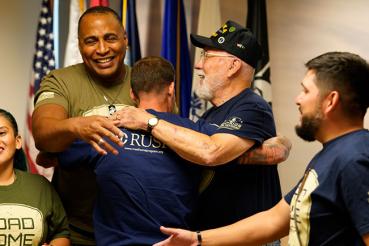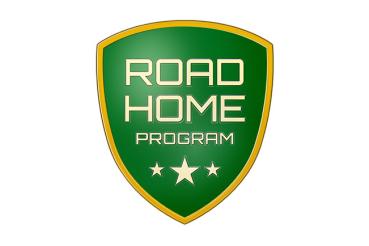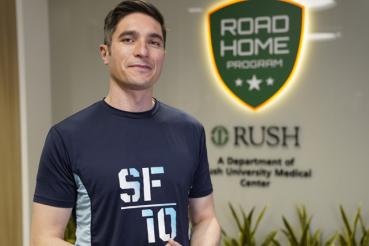Expanding Care for Veterans and Their Families
Wounded Warrior Project will provide $45 million to Rush University Medical Center to substantially grow The Road Home Program: The National Center of Excellence for Veterans and Their Families at Rush, allowing an expected 5,000 military veterans or their family members to receive mental health care services without cost to them over the next five years.
The grant, the largest single donation to Rush since its founding in 1837, will expand a Wounded Warrior Project-funded program that provides three weeks of concentrated post-traumatic stress disorder treatment, an approach that has been proven to significantly reduce post-traumatic stress disorder, or PTSD, symptoms.
“This is a transformational commitment from Wounded Warrior Project that will expand assistance to many more veterans and their families who so badly need and richly deserve these services,” said Larry Goodman, MD, CEO of Rush University Medical Center and the Rush System. “We are honored by this extraordinary commitment and the trust it shows in Rush and the Road Home Program.”
Intensive Outpatient Program found to relieve PTSD
The Road Home Program was launched in 2014 to help military veterans and their families make healthier transitions to civilian life by offering specialized mental health care, regardless of the ability to pay. In 2016 Wounded Warrior Project, Rush, Emory Healthcare in Atlanta, Massachusetts General Hospital in Boston and UCLA Health in Los Angeles collaborated to create the Warrior Care Network, a national care network that provides comprehensive mental health care to veterans living with PTSD, traumatic brain injury and related conditions.
As part of that effort, Wounded Warrior Project provided a $15 million grant for Rush to help support its treatment programs, including the development of a three-week Intensive Outpatient Program. In the IOP, as it’s known for short, groups of eight to 12 veterans whose PTSD is not responding to standard treatment receive more than 100 hours of treatment, which includes cognitive processing therapy and wellness interventions such as mindfulness, yoga, art therapy and acupuncture.
More than 260 veterans from across the country have completed IOP therapy to date, and Rush researchers have documented rapid and clinically meaningful reductions in PTSD and depression symptoms for the great majority of them.
Wounded Warrior Project grant also will support other services for veterans and their families
The new funding will make the IOP available to more than 1,500 veterans over the next five years. In addition to the IOP expansion, the funding also will enable Road Home Program clinicians and therapists to provide outpatient therapy, counseling and other services to an additional 3,500 veterans and their family members from the Chicago area and elsewhere. Because spouses, children and other family members also are affected when their loved one experiences a trauma-based mental health issue, Road Home Program provides free services to family members.
“The Road Home Program at Rush has proven to be just that — a road home for thousands of men and women wounded while serving their country,” said retired Lt. Gen. Mike Linnington, Wounded Warrior Project’s CEO. “Wounded Warrior Project has increasingly focused on improving the mental health and wellness of our veterans. Invisible wounds are as debilitating as physical injuries, but with care like that provided at Road Home, they can largely be overcome.”
Expanded services will meet growing need
As many as one in three veterans who served in the conflicts in Iraq and Afghanistan have returned to the United States with what are called the “invisible wounds of war,” including PTSD, traumatic brain injury and related mental health conditions associated with their military service.
“It is critical that the general health care system steps up to do its share to care for our servicemen and servicewomen, and their families, who have given so much for our country. This support and generosity from Wounded Warrior Project are enabling us at Rush to provide the leading-edge care and services that our warriors and their families so dearly earned,” said Mark Pollack, MD, professor and chairperson of the Rush Department of Psychiatry and founding director of the Road Home Program.
The Road Home Program operates in a spirit of collaboration, connecting veterans to social services, education and vocational programming via local organizations. The center complements the many other important psychiatric and outreach services to veterans already offered by local Veterans Administration medical centers Edward Hines, Jr. VA Hospital; Jesse Brown VA Medical Center; and Captain James A. Lovell Federal Health Care Center.
The care, provided at no cost to the veteran and their family, helps fill in the gaps in mental health care currently not provided by VA, or to those veterans who are not eligible or prefer to not receive care through the VA. Rush coordinates continuing care with the VA, working with a liaison so the veterans can continue to get treatment inside or outside of the VA.
More than 1,000 people have received care from the Road Home Program since it was established to help military veterans and their families make healthier transitions to civilian life by offering specialized mental health care, peer-to-peer outreach, counseling and community resource navigation. This care includes evidence-based treatment for PTSD, traumatic brain injury and military sexual trauma; child and family counseling; service and resource navigation; peer-to-peer outreach; public awareness programming; and training for primary care physicians and others.
The road home to healing
Our compassionate donors recognize every veteran returns home with their own unique experience and needs. Each gift makes the Road Home Program a destination for those struggling to transition back into civilian life. But it’s never a one-size-fits-all approach to treatment. Donor support allows Rush to offer a distinct variety of programs needed to heal veterans from all walks of life.
Where there’s a will
At age 24, United States Navy Lieutenant Junior Grade William B. McIlvaine III was killed while serving as a Naval Flight Officer on an E/A6-B Prowler aircraft that crashed during a training flight. With his combined love for music, art and science, McIlvaine was known widely as a true “renaissance man.” Now his legacy lives on through the LTJG William B. McIlvaine III Creative Art Program initiative at the Road Home due to a generous gift made by his grandparents, Mr. and Mrs. William B. McIlvaine. The initiative employs art therapy to treat psychological disorders related to PTSD and traumatic brain injury. As lifelong art enthusiasts and gallery owners, the McIlvaines understand the profound impact art can make. The cornerstone of their support provides three years of crucial programmatic funding for creative art programs, through which hundreds of veterans and their families will work with a dedicated art therapist to express in art what is inexpressible to them in words.
Top-flight treatment
While PTSD and depression are the most commonly discussed invisible wounds of war, moral injury also affects significant numbers of veterans. Moral injury may result after service members witness acts that are morally wrong, act in ways that violate their moral values or fail to do something they believe they should’ve done. With generous support from The Boeing Company, the Road Home Program began filling a critical gap in the local continuum of care for veterans, offering specialized assessment and treatment services for those struggling with moral injury. The moral injury program offers evidence-based treatments, including cognitive processing therapy, prolonged exposure and cognitive behavioral therapy. Additionally, Boeing’s support has allowed the Road Home Program to emerge as a thought leader in moral injury, positioning itself to influence how other care providers nationwide intervene and support those struggling to process their experiences.
Leaders in change
Since 2015 the Road Home Program Leadership Committee has raised funds and awareness in support of the center’s care for veterans and their families. During that time, the committee has grown to 18 members, thanks in large part to the stewardship of its original chairman, Ron Gidwitz. Under the leadership of Gidwitz and fellow committee members, more than $4 million was raised through the annual Road Home Program Benefit. The event’s proceeds coupled with other fundraising efforts allowed Rush to match the initial $7.5 million grant from Wounded Warrior Project. As the center’s programming continues to expand, so will the efforts of the leadership committee. Rush Trustee Tom Lanctot assumed the role of committee chairman to help Road Home reach even more veterans and loved ones in need.
Constant companions
Susan Regenstein saw a problem and a possible solution: Veterans often need specialized care, and service dogs can help with an array of physical and psychological challenges. Regenstein, a longtime supporter of Rush, connected with Road Home staff, who shared recent findings of the powerful role that service dogs can play in the recovery of a veteran living with PTSD. Together the Road Home Program and The Regenstein Foundation created the Regenstein Service Dog Initiative for Veterans. The service dogs help veterans connect better with civilian life by relieving anxiety and tension, while encouraging social interaction as a counter to the withdrawal that often goes hand-in-hand with PTSD. The initiative covers all costs for feeding, training and ongoing veterinary care for the dogs.
Sponsoring success
Supporting veterans as they transition from service to civilian life has long been a key effort of BMO Harris Bank. The company has established specialized assistance for employees who served in the armed forces, while also maintaining a veteran’s advisory council and partnering with local veterans’ organizations across the country. The Road Home Program was a natural fit for BMO’s philanthropic interests. BMO has sponsored the annual Road Home Benefit for the last three years while also connecting Road Home staff with other local support groups.
Read more Rush Philanthropy News.




